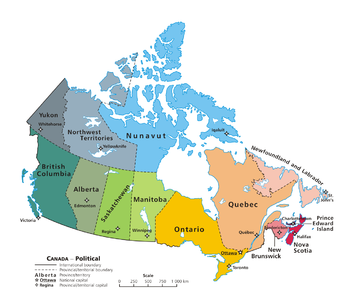 |
| English: A map of Canada exhibiting its ten provinces and three territories, and their capitals. (Lambert conformal conic projection from The Atlas of Canada) (Photo credit: Wikipedia) |
In January 2015, Citizenship and Immigration Canada (CIC) will launch a new electronic system called Express Entry to manage applications for permanent residence in certain economic programs. Canada needs high levels of immigration to meet current and future labour market needs, which will ensure our economic growth and long-term prosperity.
Express Entry will allow us to actively recruit, assess and select skilled immigrants under the following federal economic immigration programs:
- the Federal Skilled Worker Program,
- the Federal Skilled Trades Program, and
- the Canadian Experience Class.
Provinces and territories will also be able to recruit candidates from the Express Entry system for a portion of the Provincial Nominee Programs to meet local labour market needs. Under this new system, employers will also have a key role in selecting economic immigrants. Employers will access candidates through Canada's new and improved Job Bank and through provinces and territories where applicable.
The Express Entry system involves two steps:
Step 1) Potential candidates complete an online Express Entry profile
Potential candidates will complete an online Express Entry profile where they will provide information about their skills, work experience, language ability, education, and other details. Those who meet the criteria of one of the federal economic immigration programs subject to Express Entry will be placed in a pool of candidates.
Candidates will be ranked against others in the pool. Only the highest-ranked candidates (those deemed to have the best chances for economic success), and those with qualifying offers of arranged employment or provincial/territorial nominations, will be invited to apply for permanent residence.
If a candidate does not already have a valid job offer from a Canadian employer or a provincial/territorial nomination, he or she must register with the Government of Canada's Job Bank which will connect him or her with eligible Canadian employers.
Where applicable, employers will be required to obtain a Labour Market Impact Assessment from Employment and Social Development Canada. There will be no fee for Labour Market Impact Assessments for permanent residence applications under the Express Entry system.
Completing an online Express Entry profile does not guarantee that a candidate will receive an Invitation to Apply for permanent residence.
Step 2) Citizenship and Immigration Canada will invite certain candidates to apply for permanent residence and process their electronic applications within six months.
Candidates will receive an Invitation to Apply for permanent residence if they rank among the top in the pool, based on their skills and experience. Candidates who have a valid job offer from a Canadian employer (subject to the Labour Market Impact Assessment process in place at that time) or have been nominated by a province or territory will be given high scores in the ranking system.
Candidates will have 60 days to submit an electronic application for permanent residence through one of the following programs:
- Federal Skilled Worker Program (FSWP);
- Federal Skilled Trades Program (FSTP);
- Canadian Experience Class (CEC); or,
- A portion of the Provincial Nominee Program (PNP)
Citizenship and Immigration Canada will process the majority of complete applications (i.e. applications including all the necessary supporting documents) within six months or less.
Candidates in the Express Entry pool who do not receive an Invitation to Apply for permanent residence after 12 months may resubmit their profile and re-enter the pool if they still meet the criteria. This provision will prevent backlogs and ensure quick processing times.
Express Entry will result in faster and more efficient service to potential skilled immigrants. It will also allow the Government of Canada to be more flexible and responsive to Canada's changing economic conditions and priorities.
Source: http://www.cic.gc.ca/english/immigrate/express/express-entry.asp
















